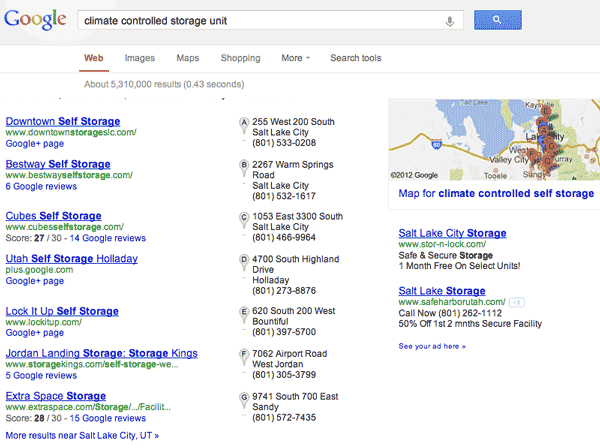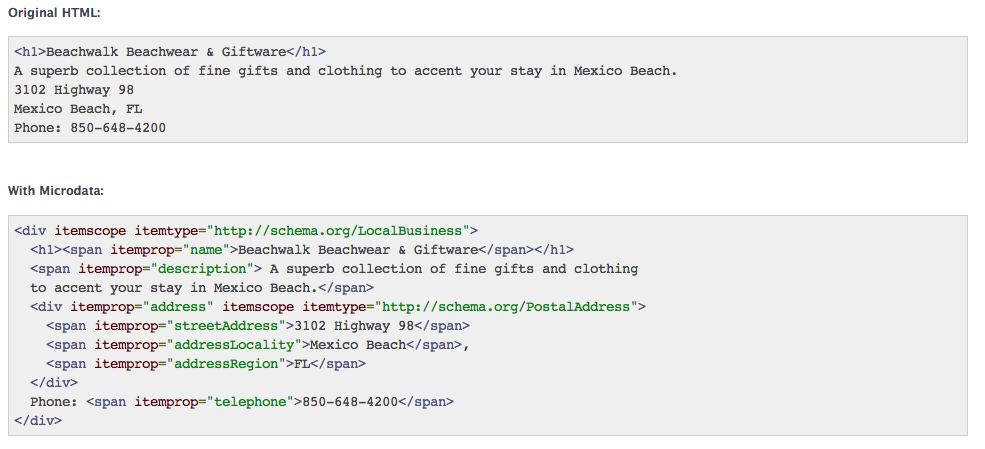We often have customers who ask us about how local search marketing is affected by the contents of their websites. Some small business owners wonder whether they even need a website to get customers to find their businesses in local search results in Google and other search engines.
The short answers to both of these questions go like this:
Does a business really need their own website in order to be found in local search results? No
Does a business’ website affect how it performs in local search results? Yes
There is a lot more to those answers than a simple yes/no answer, so I will go over this topic in detail.
Here’s an example of a Google search done in the Salt Lake City area for the term climate controlled storage unit. Looking through the local businesses displayed in the local search section of Google’s search results page, you can see that there are six different businesses that Google has determined to be relevant to that search. One of the listings, letter D – Utah Self Storage Holladay, apparently doesn’t have its own website. (After some research I found out that they actually do have their own website, but it has been hacked recently and is serving up malware, so Google isn’t willing to send people there or even list the website.) Instead of including a link to a website for Utah Self Storage, Google includes a link to their Google Plus Local page, displayed in the image below as plus.google.com.

A search for ‘climate controlled storage unit’ shows several local business listings, one of which doesn’t appear to have its own website.
This examples illustrates what are really the most essential elements of getting a business to be ranked in local search listings in Google, which are:
- Business name
- Address
- Phone number
These three pieces of information serve as (using database terms) a unique key to identify any particular business. If Google knows about your business based upon these three items, there is a potential that your listing will show up in local search results. If Google finds a company’s business information listed in an online directory (such as YellowPages.com), but doesn’t know about any website associated with the company, it will simply create a Google Plus Local page for the company and use that instead of including a link to a company website as it does in cases where one is available.
Knowing how Google treats business listings that don’t have a company website, it makes sense that the more descriptive answer to the question about whether a company absolutely needs a website to be listed in local search listings is, “No, but…”
Business Websites and Local Search Success
So what are the advantages of having a business website and associating it with your local listing? There are actually several. Here are the most important of those:
- Having a website associated with your local listing allows Google to understand your business’ products and services much better, which allows your business to show up for more search phrases than if you didn’t have a website for your specific business.
- Ranking well in local search is based largely upon how much “authority” your business listing has. Much of that ranking authority comes from your website, including links to your website, social media signals that point to your website, and search engines’ evaluation of how visitors interact with your website.
How Should A Company Website Be Implemented to Help With Local Search Results?
To help a business listing rank well in Google local searches, here’s the optimal setup for the company website.
- The name, address, and phone number should be located on the home page of the site or one click away from the home page.
- The name, address, and phone number of the company should be marked up using the appropriate categorization (for instance: Thing > Organization > LocalBusiness for general businesses or Thing > Organization > LocalBusiness > FoodEstablishment > FastFoodRestaurant for restaurants) from schema.org, which is the technical standard that has been established by Google, Bing, and Yahoo to help web masters communicate clearly to each of those search engines the purpose of the business. We’ve seen this have significant results for our customers. Here is an example from the schema.org website:

Schema.org presents a way for web masters to communicate clearly with the popular search engines and give context for the information found on the web page.
- Content on the site should explain in significant detail the products and services offered by the company. For example, Google may be willing to rank a cosmetic surgeon for a search phrase like plastic surgeon san antonio, but that doesn’t mean that the same company listing will rank for a search done for blepharoplasty surgery san antonio (blepharoplasty is a surgery that makes a person’s eyelids smoother), even though the business may be very good at performing blepharoplasties and may want more of that kind of business. However, if the company website has a page published on it that describes its blepharoplasty product, and especially if that page used the relevant schema.org classifications to describe its service, there is much more likelihood that the search engines will send blepharoplasty business to that surgeon.
- Web pages should be indexable (able to be added as individual pages to the database) by the search engines. This means that each page needs to have its own unique URL to display content. The search engines index web pages based upon URLs, so if your website is publishing several different “pages” (or distinct pieces of content) on the same URL, your content “pages” will not get indexed correctly.
- Web pages should have solid ranking authority themselves. For web pages, ranking authority comes primarily from links to the pages from other websites and from social media references (essentially links coming from Twitter, Facebook, Google+, YouTube, and other social media websites).
So there it is. To answer our second question above, a company’s website can significantly impact its ability to rank well in local searches done for phrases related to various offering from the company. Having a well-trusted website also helps a business listing to rank closer to the top of local search listings for phrases that the search engines already associate with the business.
